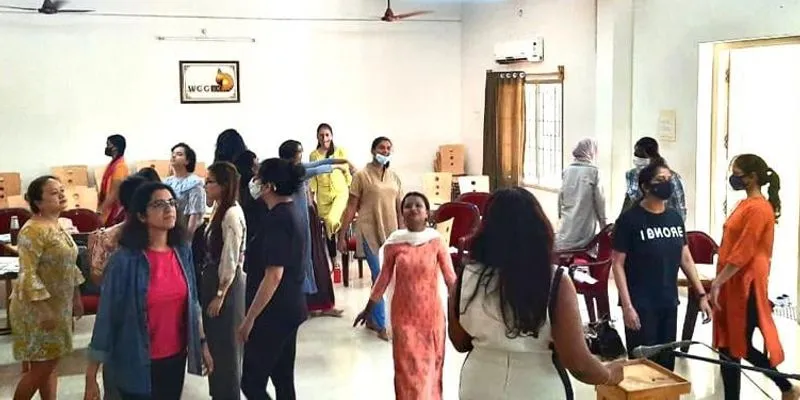How psychodrama is helping LGBTQIA+ persons overcome trauma
Award-winning psychotherapist Magdalene Jeyarathnam employs psychodrama as a therapeutic method, dramatising conflicts and solutions to help queer clients resolve trauma.
On April 4 this year, the American Society of Group Psychotherapy and Psychodrama conferred the Neil Passariello Memorial Award—presented to individuals for their contributions in the field of psychodrama for the treatment of HIV/AIDS or working with the LGBTQIA+ community—to Chennai’s Magdalene Jeyarathnam.
For the last 15 years, Jeyarathnam has fortified her psychotherapy practice with psychodrama, a modality, which helps her clients gain insight into their lives through dramatisation and role-playing. She was introduced to the concept in 2008 when she was invited by Adam Blatner, Life Fellow of the American Psychiatric Association, to attend a psychodrama session in the US led by veteran psychodrama practitioner Herb Propper.
Psychodrama changed the way Jeyarathnam remembers her relationship with her mother.
“It used to be abusive. We struggled with what we call ‘transgenerational trauma’, or trauma that is passed on from generation to generation,” she tells SocialStory. “My mother died of cancer in my arms. But it was only after her death that I was able to forgive her, and I owe that completely to psychodrama,” she adds.
Psychodrama was developed by Romanian-American psychiatrist, psycho-sociologist, and educator Jacob Moreno in 1921 to leverage the healing potential of group settings as an alternative to one-on-one therapy. The method, rooted in theatre, psychology, and sociology, uses role-playing and group dynamics to assist individuals in gaining a greater perspective on emotional concerns, conflicts, and other areas of difficulty.
“It changed my lens to the use of expressive arts in trauma and healing forever,” says Jeyaratham.
The counsellor found psychodrama to be a powerful means to address the shame, guilt, and sexual trauma that most queer people commonly endure during their childhood and teen years. She used the method to effectively address LGBTQIA+ people’s resistance to coming out.
She has been working with the LGBTQIA+ community for more than two decades, counselling transpersons and those living with HIV/AIDS. At the Indian Institute of Psychodrama in Chennai, and the East West Centre for Counselling, Jeyarathnam also uses psychodrama to counsel those living with psychotic disorders such as schizophrenia, as well as addiction.

A psychodrama session by Jeyarathnam's Indian Institute of Psychodrama, Chennai.
She found techniques such as doubling (acting as the double by physically standing close by the protagonist, mimicking their posture, and talking like them), mirroring (re-enacting the protagonist’s behaviour), and role reversal (stepping out of one’s own identity and trading places with another) as very promising as they help the clients look at their own lives from an objective standpoint and arrive at resolutions.
Dushyant (name changed on request), a social worker from Chennai who identifies as gay, first attended Jeyarathnam’s four-day workshop in 2019. The 27-year-old had been living with insomnia since childhood and traced the root cause to a bullying incident in school.
“The most necessary thing about understanding the core trigger behind my nightmares and sleepless nights was getting a second chance to respond differently to it. Through role-playing and watching different people enact situations from my life, I could choose to respond differently to the bullying I had faced as a six-year-old, and this internally shifted the outcome of that incident,” says Dushyant, who has since reclaimed the joys of sound sleep.
“It’s like resolving the conflict without relying on my perpetrators to course correct, but rather by coming to a place of resolution inside,” he adds.
Jeyarathnam emphasises the element of ‘play’ in psychodrama, which, she says, is a powerful tool for healing. “The individual steering the entire act is always the protagonist. This instantly takes them into their own journey and offers myriad perspectives to the conflict they have faced or are facing,” she adds.
Psychodrama often becomes a bridge between the objective reality and the inner subjective reality of the individual. ‘Surplus Reality’, a term used in this modality, refers to what lies in between, allowing them to enact lived and unlived experiences, either from the past, present, or future.
This aspect of psychodrama anchored Malini Jeevarathnam, a non-binary actor from Chennai, to navigate painful memories of a friend’s suicide, their mother’s passing, and the identity crisis experienced along their journey of gender expression.
Jeevarathnam has been practising psychodrama for the last ten years and believes the tool can be best used to transform anger and profound grief into empathy. “The empathy was cultivated over many sessions of role-playing I did for myself and scores of others. This expanded my endurance for every backlash I faced as a non-binary person while also making me a stronger actor and social worker,” they add.
LGBTQIA+ activist and transperson Delfina, who attended a few psychodrama sessions by Jeyarathnam, recalls reading a conversation between Sigmund Freud and Moreno, where the latter, on being asked about his occupation, said, “Well, Dr Freud, I start where you leave off…You analyse their dreams; I try to give them the courage to dream again.”
“The world around us is built on extreme gender binaries. These are evident in everything we do—from booking a train ticket to using a public washroom. So, of course, the confusion over my gender identity caused me immense pain and anxiety, but psychodrama, being a body-mind modality, put me in a room with people who were experiencing similar emotions owing to other conflicts such as being ostracised by their family for marrying outside their communities; or being stigmatised at work. And this was a lesson on how the grief of unbelonging is universal,” says Delfina.
“It gave me the strength to be grounded in my truth even as my close ones took their time and went through their emotional upheaval to process it. It helped me reach a place of equanimity, which I think is the best we can get out of life.”
Edited by Kanishk Singh







